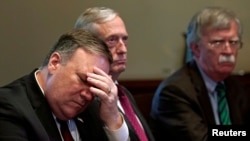U.S. Secretary of State Mike Pompeo will outline a "diplomatic road map" next week that he hopes will convince European and other allies to apply pressure on Iran and force it back to the negotiating table, a senior U.S. official said on Friday.
Rebuffing appeals from France, Germany and Britain, U.S. President Donald Trump withdrew the United States 10 days ago from a landmark 2015 nuclear deal between Iran and six major powers, saying the agreement did not adequately curb Iran's nuclear ambitions or address Iran's ballistic missile program and what the Trump administration views as its destabilizing role in the region.
In his first foreign policy speech on Monday, Pompeo will call for broad support to address "the totality of Iran's threats," said Brian Hook, senior U.S. policy advisor, adding that Washington is seeking a diplomatic outcome with Iran.
"The goal of our effort is to bring all necessary pressure to bear on Iran to change its behavior and to pursue a new framework that can resolve our concerns," Hook told reporters.
"We very much want to be, to have a kind of uptempo diplomacy, one that's very focused and very determined to achieve our national security objectives," he said, adding: "Our broad approach now that we have been emphasizing is that we need a new, a framework that's going to address the
totality of Iran threats."
It was not immediately clear whether Britain, France and Germany would agree to join the U.S. coalition as Washington moves to reimpose sanctions against Iran and they try to salvage economic and trade ties with Tehran that followed the 2015 nuclear deal.
Under the agreement, reached to halt what Western countries long suspected was Iran's attempt to develop nuclear weapons, Tehran agreed to limits on its nuclear program in exchange for the lifting of sanctions against it. Iran has denied it sought in the past to develop an atomic weapon, saying its nuclear program has always been for purely peaceful purposes.
Hook said the Iran nuclear accord had given countries a false sense of security and the United States wanted to ensure any new agreement covered not only Iran's nuclear and missile capabilities, but also curbed its regional activities.
"This involves a range of things around its nuclear program, missiles, proliferating missiles and missile technology and support for terrorists and its aggressive and violent activities that fuel civil wars in Syria and Yemen," said Hook.
Pompeo had been in discussions with European allies since Trump's announcement Washington was withdrawing from the deal and Hook said he believed differences could be overcome.
"We have a period of opportunity to work with our allies to try to come up with a new security architecture, a new framework," said Hook, "I think people are overstating the disagreements between the U.S. and Europe."





